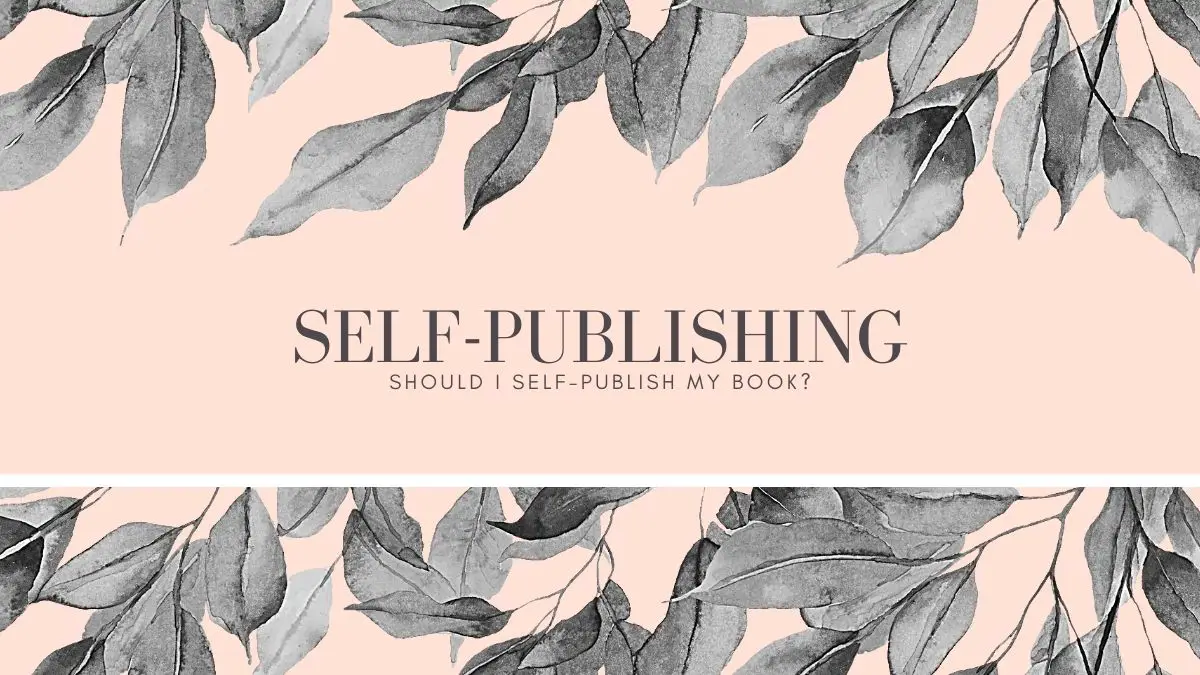Table of Contents
- Have you tried approaching a publisher before?
- Do you have a manuscript, or is your book still an idea?
- You will need to handle the production
- But, you will have more creative control
- A bit like starting a business
- Self-publishing does not mean you should publish low-quality books
- So, should I self-publish my book?
One of the most common questions posed by an aspiring author is: should I self-publish my book?
The path to publishing your book with a big publishing house can be overwhelmingly difficult. You will need a compelling book proposal that complies with all the requirements and format. And yet, this still does not promise acceptance for publication.
Big publishers have certain criteria that have to be met by authors. Authors also need to compete with each other, making the competition even stiffer.
Because of this competition, publishers begin to tighten up controls and criteria.
For example, some publishers want to know how influential the author is in the social circle, requiring authors to have a minimum number of social media followers (50K, for example). Some others may want to work only with those who have published a book before.
These are a turn-off to many small-time authors wanting to showcase their creative endeavors.
Hence, many would think that self-publishing would be the perfect alternative to solve the dilemma.
Here are some of the considerations you should take before deciding if self-publishing is your path.

Have you tried approaching a publisher before?
Have you approached a publisher seeking the possibility of publishing your book? Did you complete the book proposal stage only to receive that dreaded rejection letter?
If your experience dealing with a publisher has not been encouraging, perhaps yes, it’s time that you try self-publishing your book.
But if you have not approached any publisher before, try talking to a few acquisition editors from different publishing companies. Find out their requirements and processes in getting a book published.
See how things develop from there.
Chances are, some publishers would be willing to look at your book proposal or the complete manuscript if you have one. You may network with somebody new. This new acquaintance may do you good in the future.
You can also identify publishing companies that offer “hybrid” services, where they work together with authors to self-publish their books. This option is good for those who want self-publishing benefits but don’t want to go through all the effort of self-publishing.
“Hybrid publishing” is defined as a partnership between self-published authors and traditional book publishers, where the publisher uses its resources to help get an author’s work noticed by various retailers and readers while also providing some degree of editing and marketing services. The arrangement allows you to keep 100% creative control over your work while still having a publisher’s backing and input.

Do you have a manuscript, or is your book still an idea?
Assess what stage of book creation you are at now.
Have you written anything? Perhaps the first chapter of the book? Or maybe you have begun crafting the book proposal.
Or is your book still at the ideation stage?
It isn’t easy to decide which path you should go if there is nothing to show at this point.
What you should do is start writing some content or outline of your book. At the very least, it should be clear the genre of the book you are writing, the audience, some plots (for fiction books), synopsis, and proposed chapters.
Once you start, you can gauge if you can put the discipline to complete the book in a certain time, say in six months. If you can maintain good scheduling, chances are you can work with a traditional publisher since they always prefer to work with authors with the right discipline.

You will need to handle the production
By self-publishing your book, you will have to take care of the production of your work. This critical production process includes editing, copyediting, proofreading, interior layout, and cover design.
Now, these are many elements, and you can’t do it on your own (for one, there are reasons why different sets of eyes do editing, copyediting, and proofreading). But, more importantly, you also need to find qualified people to undertake these crucial tasks.
Hence, you will need to invest money and resources in getting the production process done.
But, you will have more creative control
Having more creative control over your book is fantastic. You will have more say on the cover design, book title, editing process, and so forth.
If you self-publish your work, then these are things that you can decide at this point rather than waiting for approval from an acquisition editor or having to ask if it fits within the publisher’s guidelines (which can also be restricting).
If you are the type who micromanages and would like to monitor many different aspects of your book publication, then self-publishing is certainly a good option.
A bit like starting a business
Self-publishing your book is a bit like starting a business.
Self-publishing requires you to make the right decisions in marketing and promotion. You need to invest money (even if it means spending on paid ads) in getting people’s attention about your work and getting your book sales on traction.
Self-publishing requires you to be resourceful and make smart decisions all the time. You need to know your audience well to find out what marketing approaches will work best for them.
One good thing about self-publishing is that you get to keep the big chunk of the profits yourself once you minus all the production and marketing costs.
If a traditional publisher gives you anywhere between 5% and 20% cut from sales, you will keep 50% or more profits by self-publishing. If your book sells one thousand copies, you are on a home run.

Self-publishing does not mean you should publish low-quality books
Things can get overwhelming when you have to do so much stuff to get the book out, promote it, and process the sales.
Because of this, you are prone to errors and tiredness. As a result, the quality of your book may be jeopardized. You certainly do not want to put yourself in this situation.
This is why self-published authors are constantly reminded that they need to produce work of high quality. And maintaining this high quality requires considerable investment.
Thread carefully.
So, should I self-publish my book?
I hope that some of the pointers discussed above would allow you to answer that “should I self-publish my book” question.
There are always pros and cons of doing things, and publishing books are no exception.
When you decide to self-publish your book, prepare to work hard in getting the production done with the best possible quality. And once your book is published, it is not the time to rest yet. You will need to take your effort up a notch in getting your book marketed, noticed, and sold.

8 thoughts on “Should I Self-Publish My Book? 6 Things to Consider”